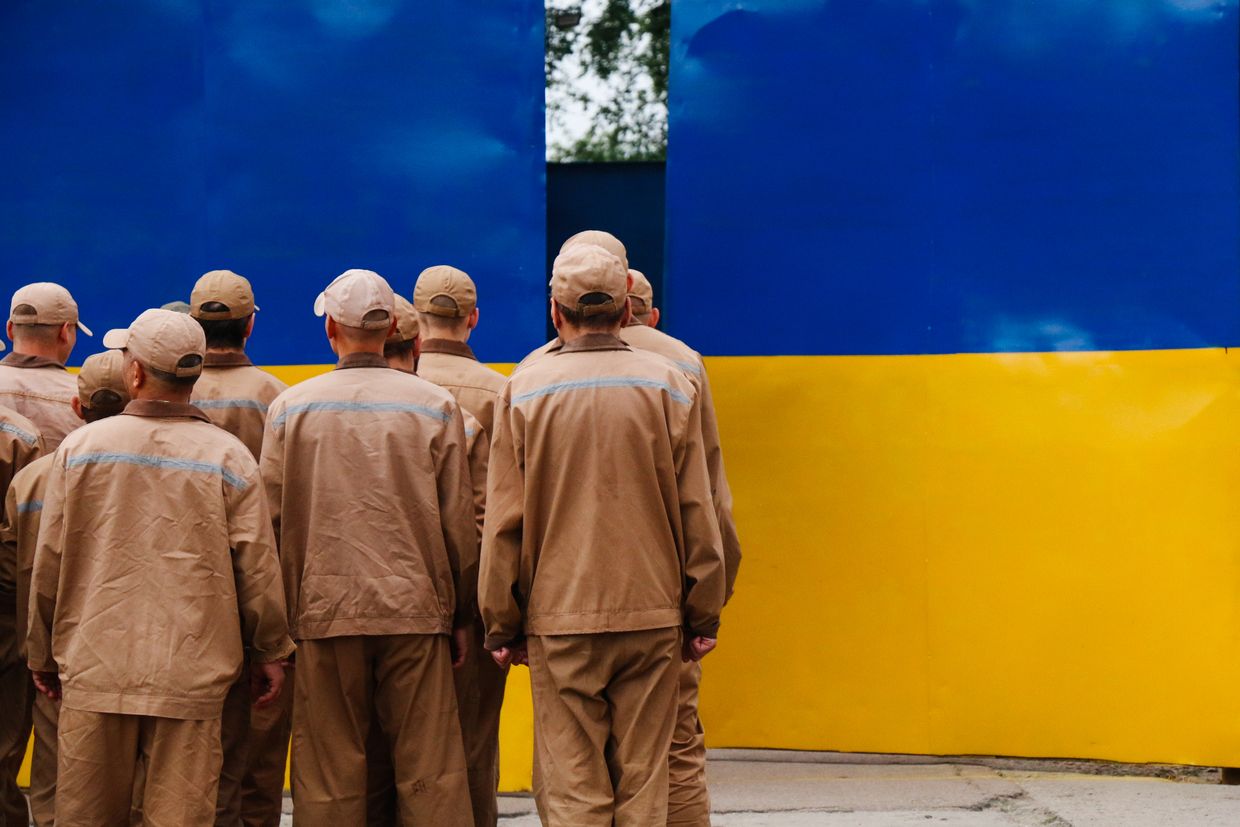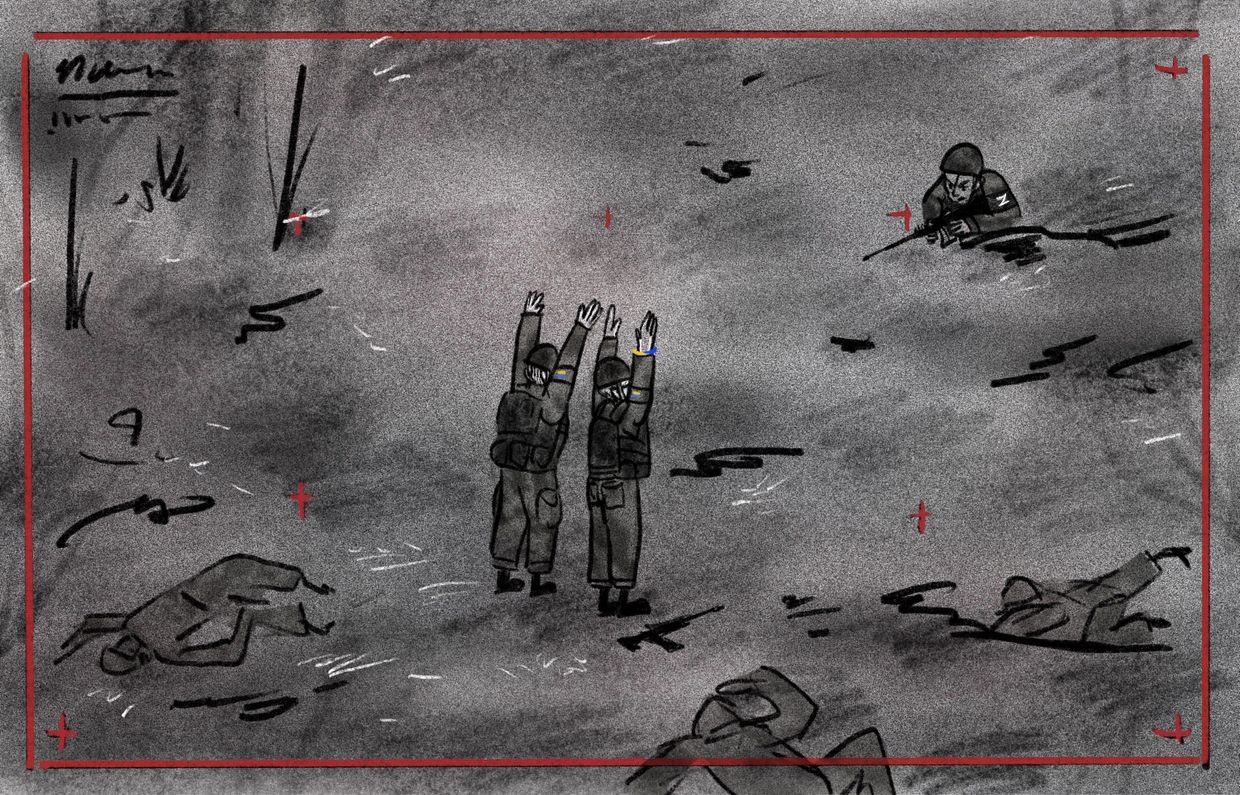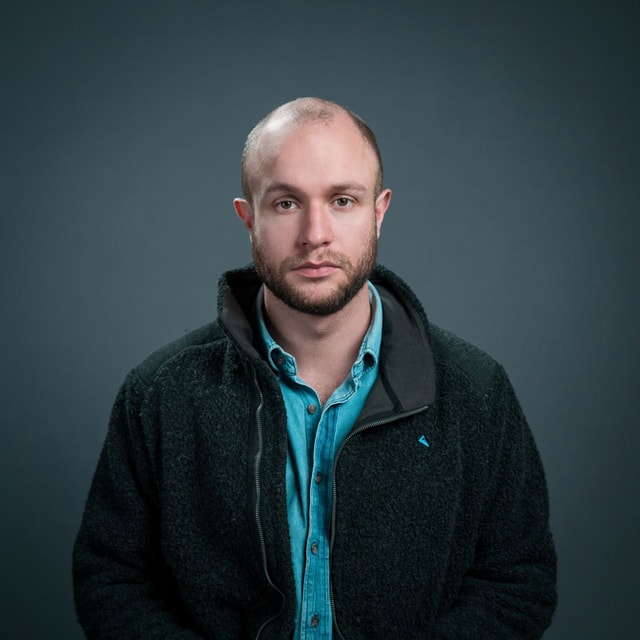Meet the Ukrainian prisoner soldiers entering the fray in the Battle of Donbas
Volunteering to fight amid serious manpower shortages in the Ukrainian military, the country's ex-convict soldiers are ready to show their worth in battle.

Viktor, an ex-prisoner soldier of the 1st Separate Assault Battalion "Da Vinci" at a training ground in Donetsk Oblast on Sept. 12, 2023. (Francis Farrell/The Kyiv Independent)
Editor’s note: In accordance with the security protocols of the Ukrainian military, soldiers featured in this story are identified by first names and callsigns only.
DONETSK OBLAST – Sitting around in the long, dry grass outside an abandoned village house, two dozen men in summer military fatigues listen attentively to a morning lesson.
“We engage here. These people who were in these positions here run 20 meters across the open area and defend here,” lectures the young instructor, flicking his marker across the whiteboard to represent rifle fire. “If we need to withdraw, our friend throws two grenades on the move and retreats here.”
Sergeant Vadym “Malyi,” 26, is no stranger to teaching the bare bones of infantry tactics to new recruits.
“Now, in order to storm you, the scum needs to get out of the trenches,” he continues. “This area, 20 meters, is out in the open. What does it give us? A chance to kill this guy.”
Vadym’s students, wearing the most basic standard issue pixel camouflage, are no ordinary Ukrainian infantrymen: just a few months earlier, they were all behind bars, serving out sentences in the country’s prison system.
These men make up the 5th Assault Company of Ukraine’s 1st Separate Assault Battalion, named after its late commander Dmytro Kotsiubailo, better known as “Da Vinci.”
A year and a half after Russia first began filling out its ranks with former convicts, Ukraine, beset by chronic manpower shortages and struggling to draft enough soldiers through recruiting and mobilization, finally turned to its own prison population when parliament passed the respective law allowing them to serve in May.
Unlike among the general civilian population, the recruitment of prisoners is done on a volunteer basis only, and even then, those serving time for serious crimes such as rape, multiple murders, or crimes against the security of Ukraine are barred from signing up.
According to Ukrainian authorities, by the end of July, around 3,800 former prisoners had been recruited and spread among the Armed Forces’ existing fighting formations in special units like this.


The Kyiv Independent spent a day with the company — already the second such unit in the Da Vinci battalion — as it prepared for its first combat missions in southern Donetsk Oblast, just as Russian forces further ramped up offensive efforts in the area.
“People mobilized nowadays often do not know where they are going, and not many have a desire to continue service here and really defend their home,” Vadym said.
“So when these people came to us, those who were sentenced, it was a flow of new energy; they are really motivated, they still want to destroy the scum and defend their country.”
Restoring honor
As the lecture concludes, the prisoners are let go for a lunch break before a planned training session on the firing range.
Lunch here looks very different from that which the ex-convicts would have eaten in prison, often called the “zone” in post-Soviet prison slang.
It’s not even about the food, which the men cook themselves, but about the circumstances of relative freedom in which they live in general.
Lodging up in village houses not too far from the contact line, there is little that now distinguishes the company from other soldiers living in the village.

“As they took us from the zone to the base, in an ordinary bus, I was in awe,” said Oleksii “Blondie,” 25, as he helped himself to a bowl of instant noodles and cured pig fat.
“After five years in jail — I had been so young when they put me away — I was free.”
Oleksii sports a light blond buzzcut, and, like many in the company, had been serving time for robbery: a seven-year sentence at age 20.
“I'm an orphan, I have no parents, only a grandmother. I've never sat on anyone's lap, I tried to buy everything I wanted for myself,” he said. “And where would I get the money? By stealing.”
Although they haven’t fought yet as a unit here, many of the men already got a very brief glimpse of combat experience in short stints in Ukraine’s 152nd or 153rd mechanized brigades, which had initially recruited them from prison before they were transferred to the Da Vinci battalion.

Oleksii only saw a couple of combat missions, both in Kharkiv Oblast, in the first months of Russia’s repeat offensive there.
Now, he looks forward to the end of the war, to a chance to begin a different life, one in which he is not stigmatized by society as a simple criminal.
“Look, I've been in prison for five years,” he said.
“I wanted to be released not as a convict, but to come home as a hero. Not to be released and come home as the same piece of s*** that arrived.”
Further down the village road is the house — or rather, car — now home to Volodymyr, who goes by the callsign “Champion.”
Still shirtless upon first meeting, Volodymyr sports two tattoos of eight-pointed stars near his shoulders, a symbol of authority in prison.
Now issued a Czech-made rifle, the 39-year-old Kyiv native, who was also serving for armed robbery, is in charge of security at the company base.

Speaking to the Kyiv Independent with a focused, thoughtful temperament, Volodymyr recalls how the full-scale war gave him a new drive to turn his life around.
“At the beginning of the full-scale invasion, I wrote a statement to the President to beg for forgiveness,” he recalled.
“There are a lot of people in the zone who really want to defend the country and wrote statements from the first day to release them.”
Two years passed with no reply, but in 2024 the decision was finally made, out of necessity dictated by the bleak manpower shortage on the battlefield.
“We are different in size from the country of the aggressor,” said Vadym, “that's why we need to protect everyone and make it possible to benefit the country.”
“But also to benefit even those people who have been sentenced. They can spend their lives with the deeds accomplished and their dignified time here in the army.”
“Yes, I was imprisoned in my homeland. But it's my fault. I have to change my attitude towards other people,” said Volodymyr.
“To be honest, I don't consider myself a hero. But I have to change something. To change myself.”

Shaking old habits
As the men wrap up their lunch and prepare to head to the training ground, a commotion begins outside one of the houses.
Disobeying strict rules against the consumption of alcohol for the ex-convict soldiers, one of them is caught with a bottle of spirits, not for the first time.
Calling the rest of the company over to the yard for a chat, Vadym decides to make an example of this case, sending the man to solitary confinement in a cellar.
As sincere as the motivations of many of the ex-convicts might be, discipline is still a major issue in companies like this.
These final days before their first combat missions are crucial.
To survive on the battlefield, Vadym says, they will need not only to train hard, but more importantly, to step away from prison culture and mindset, defined by the slang word “poniattia” (“concepts”).

Once the whole company forms a circle in the yard, the sergeant begins his speech.
“We have a general problem,” he says, “we have people who still live with their concepts that you had in the zone.”
“Understand, those concepts must stay there. Here we are like children. We have just been born, and now we will show ourselves.”
The prisoners listen, mostly in silence, though some interject with mumbles of approval.
“There are plenty of issues with discipline, about how they orient themselves; many just do not understand where they are yet,” he said, “some really wanted to defend their country, but some just wanted to leave the zone.”
A former theater worker in Kyiv, 47-year-old Oleh “Udav,” also serving time for robbery, never got used to the internal laws and concepts of prison life.
When army recruiters came to his prison, he saw a chance to escape that world and begin a difficult journey back to normal life, where his wife and daughter were waiting.
“I still don’t feel free, because I’m not at home,” he said. “I haven’t seen my parents, my daughter.”

Now, although prison culture is still all around him in the unit, Oleh is focused on the great unknown ahead of him: battle.
“I watch a lot of videos on YouTube,” he said, “I watch how the trenches are stormed, and how to work in an urban area. I watch everything about the fighting.”
“Psychologically, I prepare myself for it. But I am not worried, I'm not afraid of death. I'm a sane person. I want to live. I want to see tomorrow.”
In the yard, Vadym’s speech continues.
“We could already get the order now that tomorrow five people need to head to the position, and that’s it, off you go,” he says. “And then again, you will say, ‘we are not ready, we are this and that,’ because we spent our time on these domestic issues, these explanations I have to give you now. ”
“Out there, they will f*** us, when here, among us, we could have solved these issues.”
Eve of battle
The last gasp of autumn heat sun bears down on the burnt grass of the training range outside the village.
“Forward! Shift left!” Vadym’s commands ring out as five men carry out squad-level movement drills on the hillside before moving on to live fire.
Awkward in their movement and sometimes slow to remember the basic drills, the ex-convicts still look a little ragtag in action, but they run hard and pay close attention to the head sergeant’s corrections.
In the following days, after refining their moving and firing as a group, they will move on to orientation drills with a compass, before mastering Kropyva, the Ukrainian battlefield mapping software.
In between drills, Vadym continues to speak to his new recruits.
“In our army, no one thinks about the fighters. A fighter is a unit. For some, it is a valuable unit,” he says, ”It is a rarity. They will keep them, impart knowledge, teach them to survive.”
“But for someone else, they will be just a unit, which they will send wherever. In this battalion, we do not do this.”
In these words lies an issue at the heart of whether these men will live to see freedom and amnesty when hostilities end: their treatment by command.
When Russia’s Wagner mercenary group first started recruiting tens of thousands of prisoners into its ranks, they were famously used as the most expendable of assault troops: walking slowly forward in small groups towards Ukrainian lines, forbidden to retreat with threats of execution, and rarely surviving beyond their first combat mission.

As far removed as the Ukrainian command is from the style of Wagner, the similar issue of prisoners’ lives being treated with less value can still rear its head: when commanders are given control of a prisoner unit, they are more likely to give them the most dangerous missions to protect the others.
“It's not like we have some separate operations for them and for civilians who came from home,” Vadym said to the Kyiv Independent, “No, we all have the same operations.”
“We are all here in equal conditions. We don't have what we have behind us, only what (the knowledge and experience) we have gathered here.”
In a war defined by a heavily armed, deadly attritional struggle, the prisoners will need all the help they can get to make it to the end of the war in one piece.
But first and foremost, for the best chances they must help themselves, and those other former prisoners in their ranks, by training, learning, and putting their past lives behind them.
“I want to see my daughter grow up and get married,” said Oleh.
“I don't want to die, and I really don't want to die because of stupid things, like my fellow soldier. I don't want to die because of fear. I know that if I decide to do something, I'm going to do it.”
You can watch the video version of this story here:

Note from the author:
Hi, this is Francis Farrell, cheers for reading this article. This is the last of three stories that we will publish from our field trip to the Pokrovsk direction at one of the most critical times for the Ukrainian defense of Donbas since the start of this war. Whatever happens and however it is presented in the world's media, we see it as our job to bring you the reality from the ground in its most raw and honest form. Please consider supporting our reporting.



















